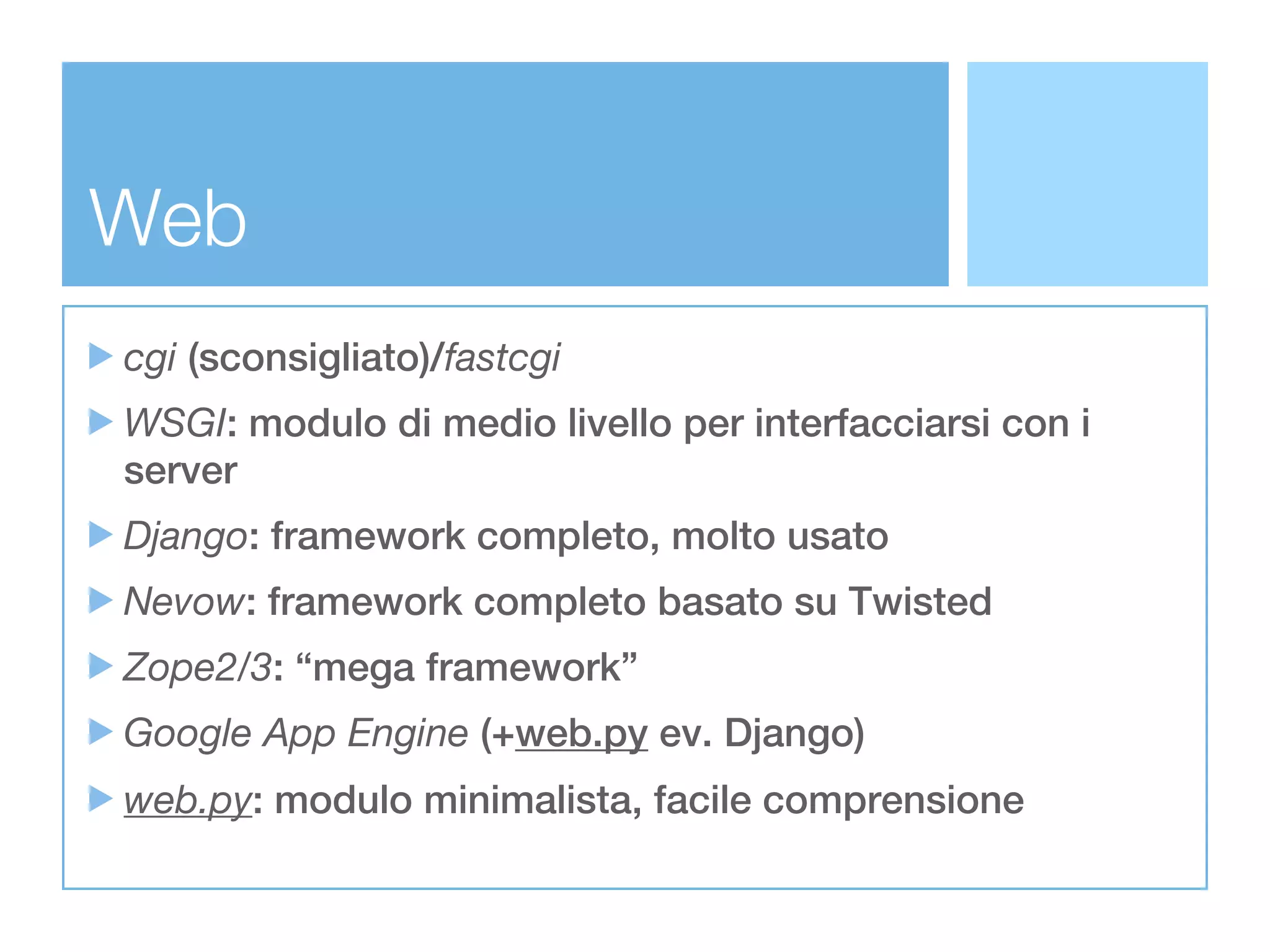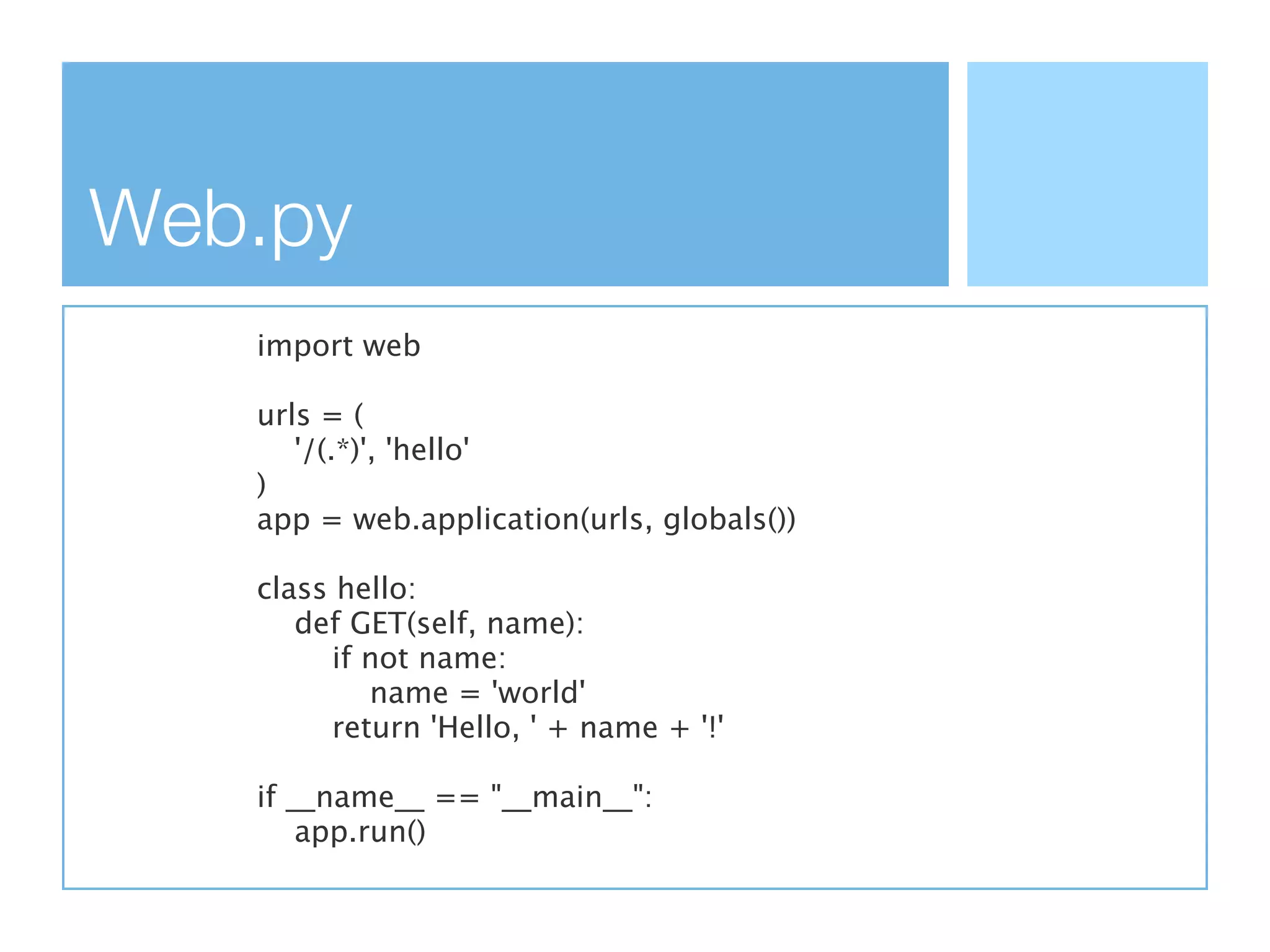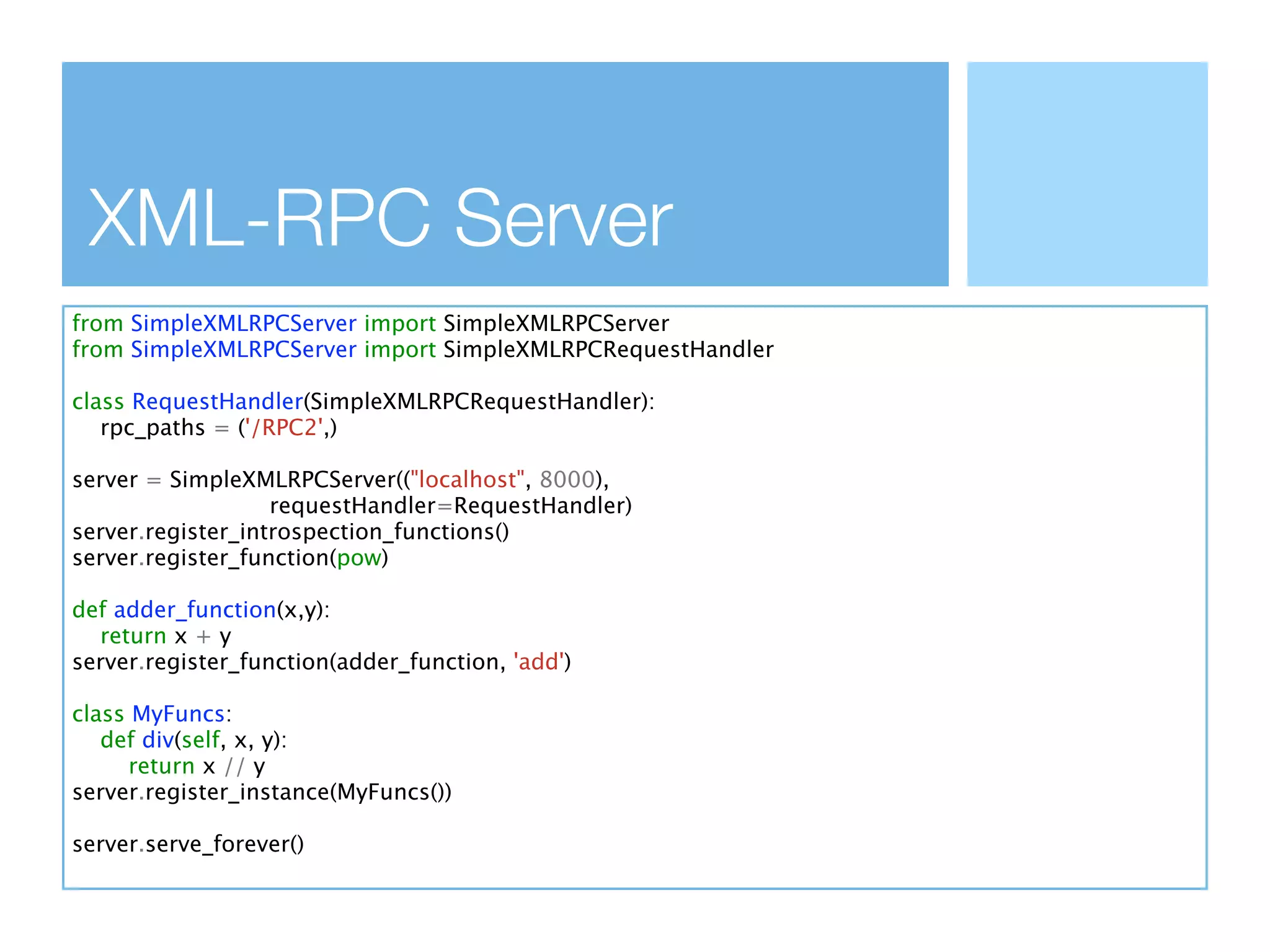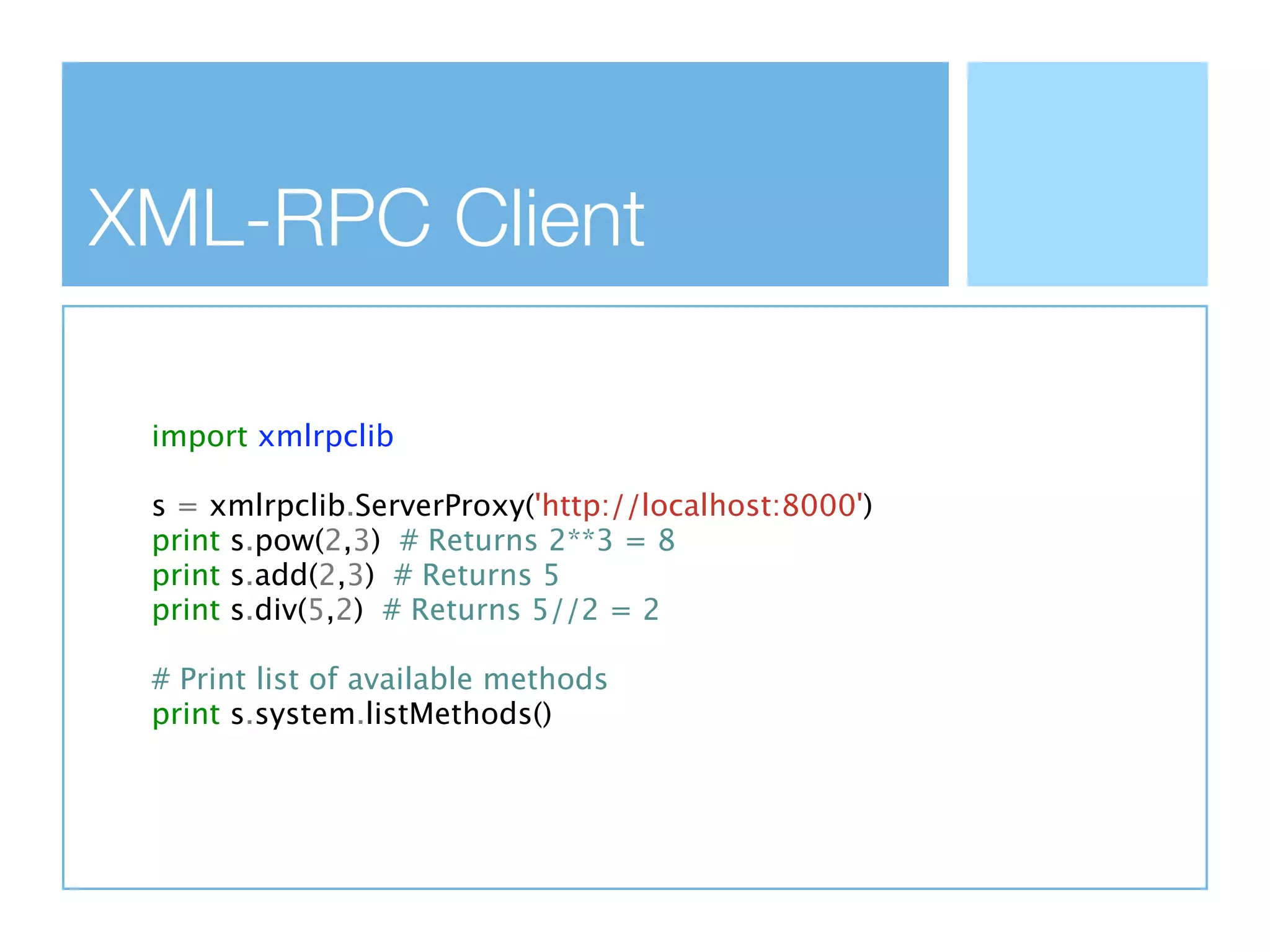The document discusses advanced Python concepts including dynamic attributes and the use of built-in functions like getattr, setattr, and hasattr for introspection. It also explores design patterns such as the State Pattern in the context of a gumball machine simulation, demonstrating how to manage different states using Python classes. Additionally, it touches on the implementation of server-side modules using socketserver and mentions best practices for handling multiple requests.

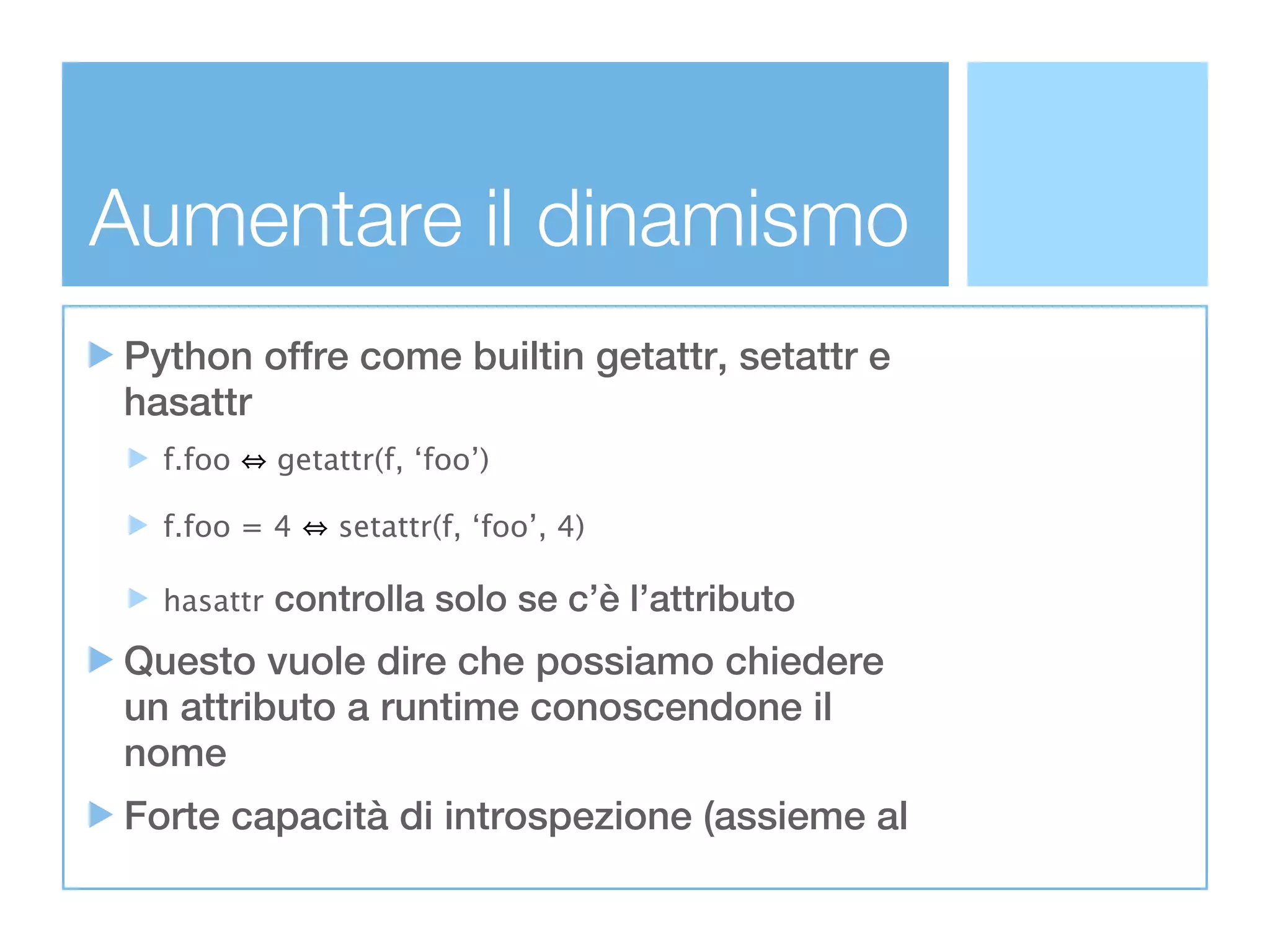
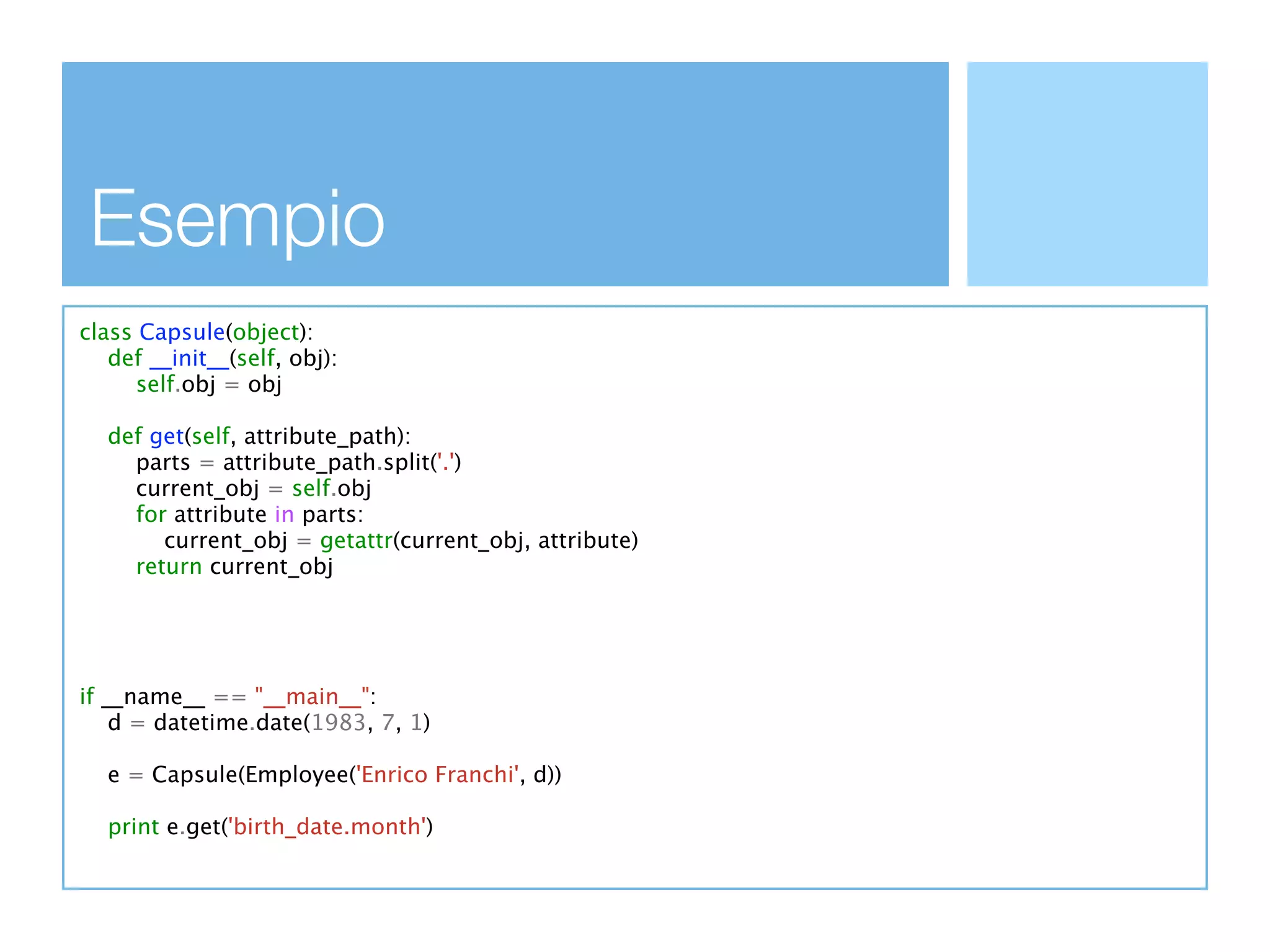
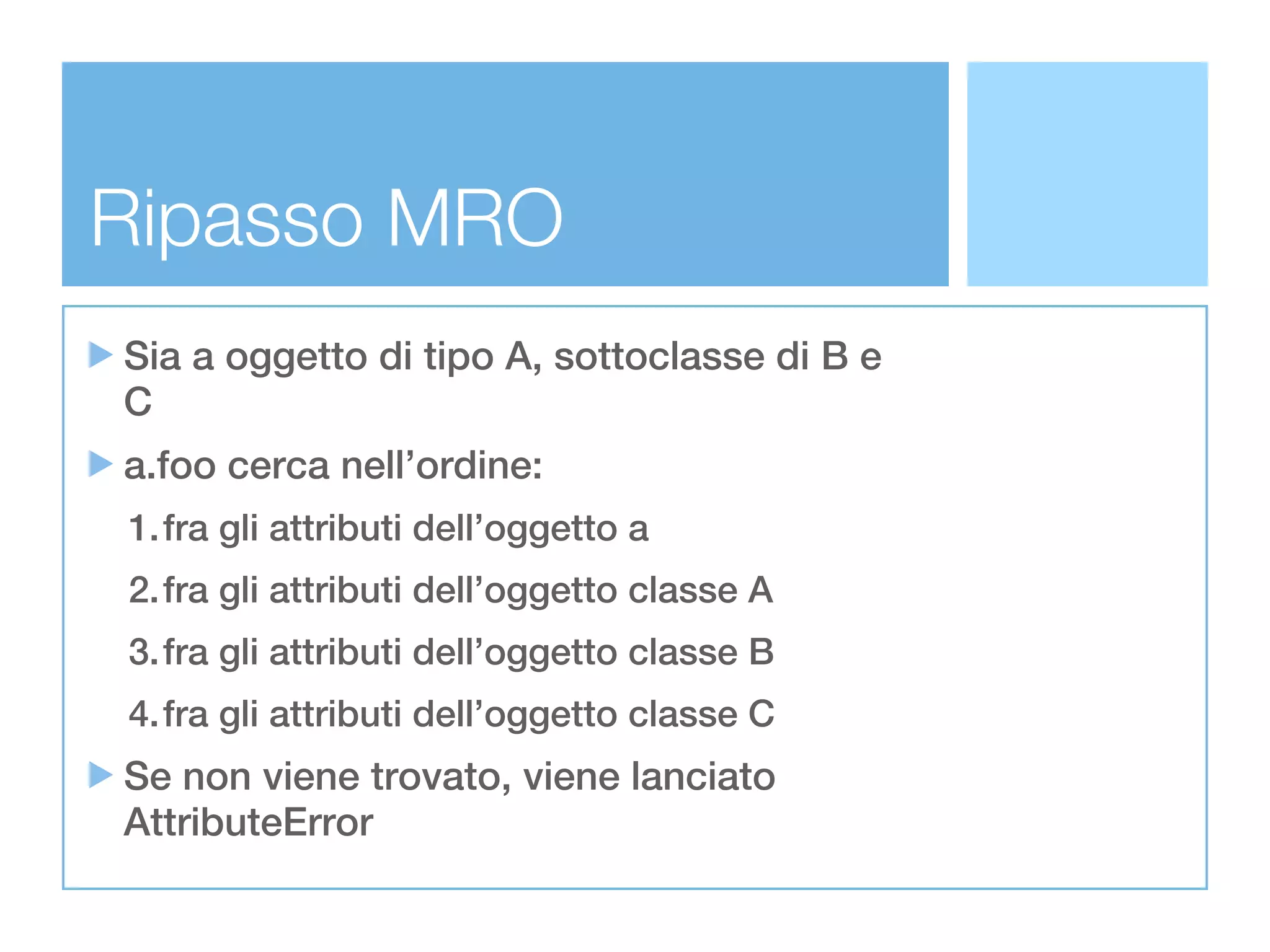
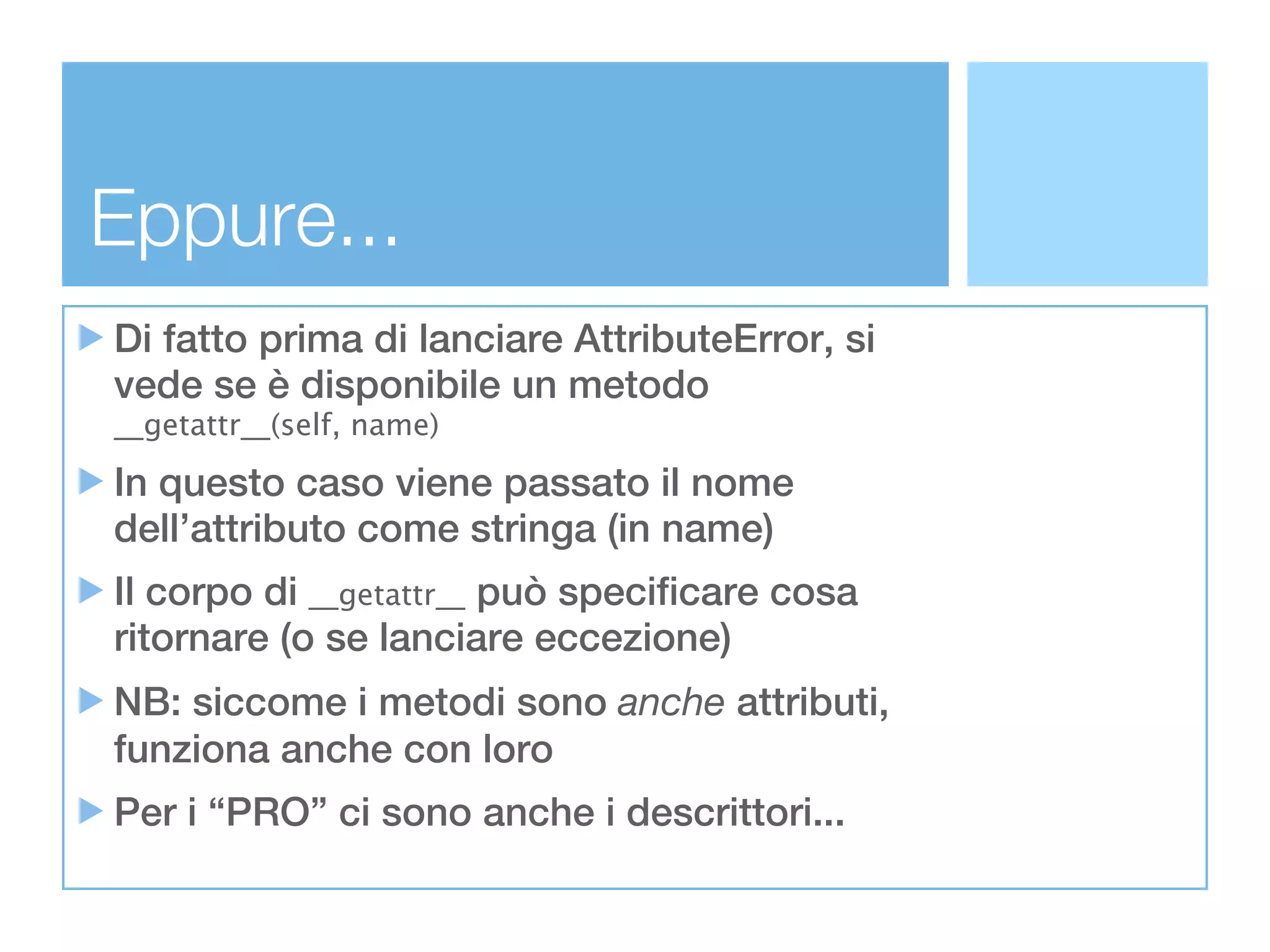
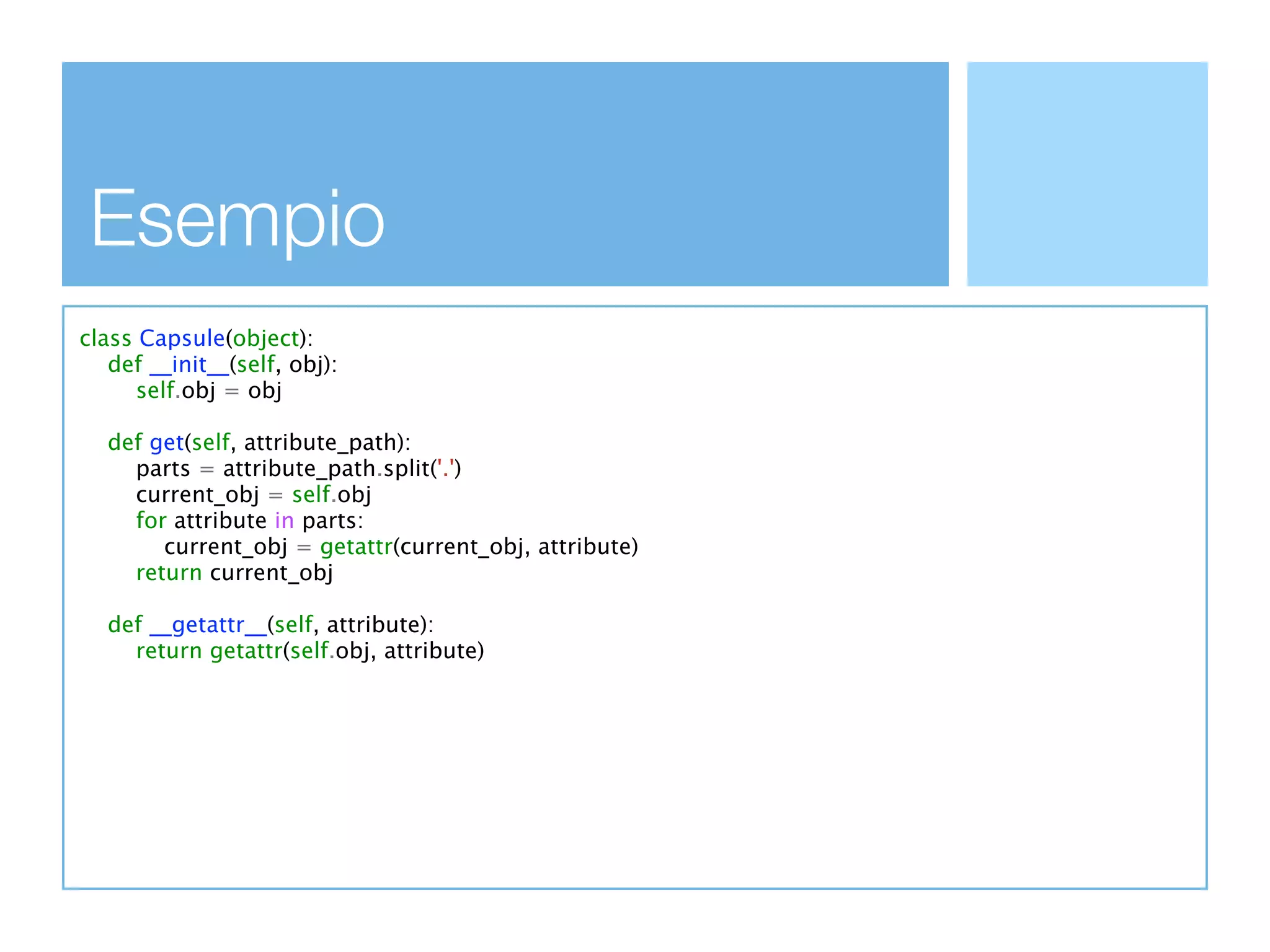
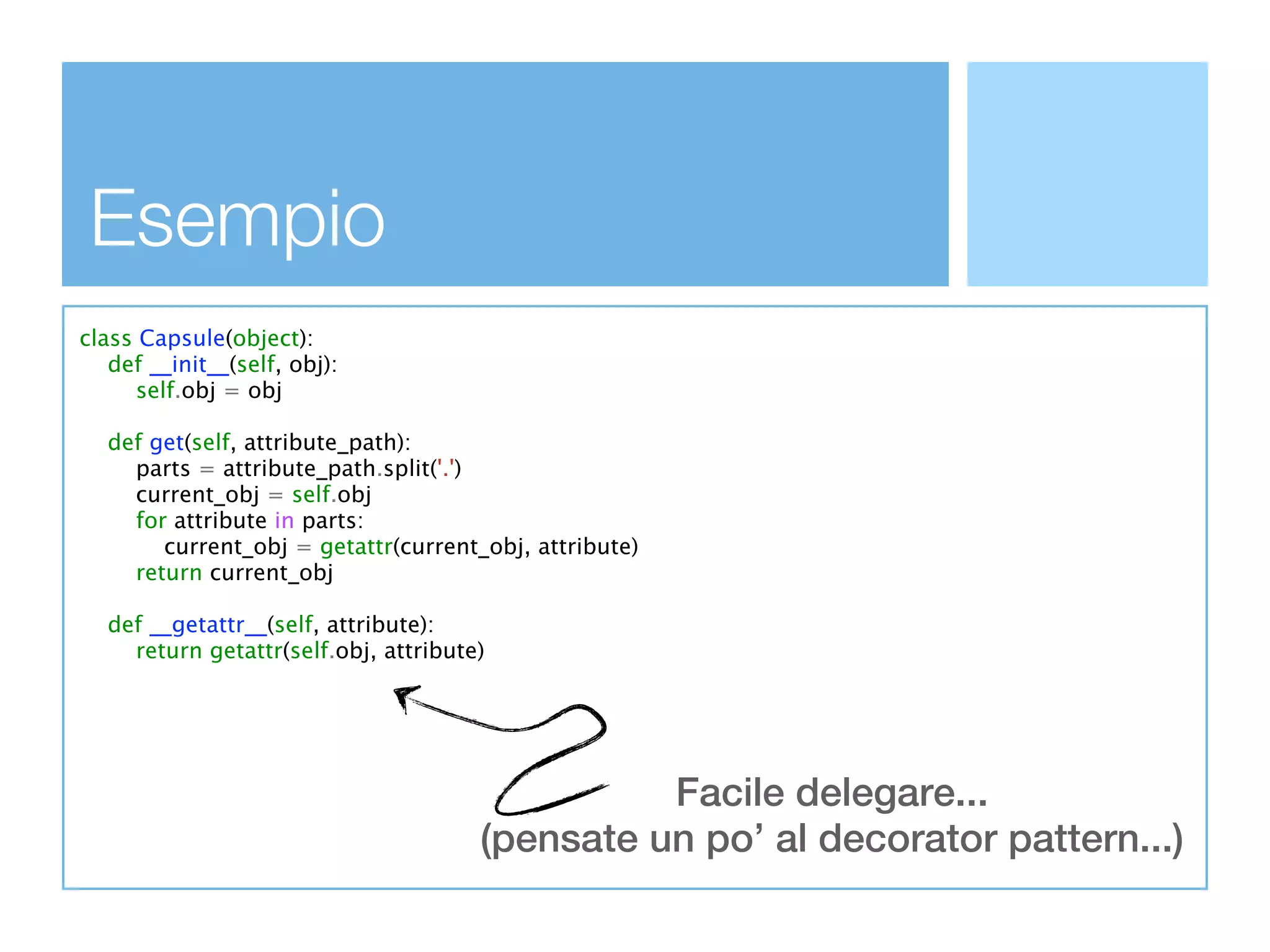
![Esempio
class Enum(object):
def __init__(self, *args, **kargs):
self._enums = dict(((name, i) for i, name in enumerate(args)))
min_val, max_val = 0, len(args)
for k, v in kargs.iteritems():
if min_val < v < max_val:
raise ValueError, ('Value %s already specified' % v)
else:
self._enums[k] = v
def __getattr__(self, name):
try:
return self._enums[name]
except KeyError:
raise AttributeError](https://image.slidesharecdn.com/pyimprovedagain-111019032257-phpapp01/75/Pyimproved-again-8-2048.jpg)
![Esempio
class Enum(object):
def __init__(self, *args, **kargs):
self._enums = dict(((name, i) for i, name in enumerate(args)))
min_val, max_val = 0, len(args)
for k, v in kargs.iteritems():
if min_val < v < max_val:
raise ValueError, ('Value %s already specified' % v)
else:
self._enums[k] = v
def __getattr__(self, name):
try:
return self._enums[name]
except KeyError:
raise AttributeError
Per Enum fatte a modo, qui.
Meglio ancora le named tuples.](https://image.slidesharecdn.com/pyimprovedagain-111019032257-phpapp01/75/Pyimproved-again-9-2048.jpg)
![Funzioni create a runtime
class Collection(object):
def __init__(self, l=None):
self.buf = l or []
def find(self, **kargs):
temp_buf = self.buf
for k, v in kargs.iteritems():
temp_buf = [item for item in temp_buf
if getattr(item, k) == v]
return temp_buf](https://image.slidesharecdn.com/pyimprovedagain-111019032257-phpapp01/75/Pyimproved-again-10-2048.jpg)
![Funzioni create a runtime
class Collection(object):
def __init__(self, l=None):
self.buf = l or []
def find(self, **kargs):
temp_buf = self.buf
for k, v b1 kargs.iteritems():
in = book.Book('Python in a Nutshell', 'Alex Martelli')
temp_buf = [item for item in temp_buf 'Alex Martelli')
b2 = book.Book('Python Cookbook',
b3 if getattr(item, k) == v]
= book.Book('Python', 'Marco Beri')
return temp_buf
b4 = book.Book('Sviluppare applicazioni web con Django',
'Marco Beri')
b5 = book.Book('Espressioni Regolari', 'Marco Beri')
c = Collection([b1, b2, b3, b4, b5])
for b in c.find(title='Python', author='Marco Beri'):
print b](https://image.slidesharecdn.com/pyimprovedagain-111019032257-phpapp01/75/Pyimproved-again-11-2048.jpg)
![Funzioni create a runtime
class Collection(object):
def __init__(self, l=None):
self.buf = l or []
def find(self, **kargs):
temp_buf = self.buf
for k, v in kargs.iteritems():
temp_buf = [item for item in temp_buf
if getattr(item, k) == v]
return temp_buf
@classmethod
def add_method(cls, func, name):
func.im_class = cls
func.im_func = func
func.im_self = None
func.func_name = name
setattr(cls, name, func)](https://image.slidesharecdn.com/pyimprovedagain-111019032257-phpapp01/75/Pyimproved-again-12-2048.jpg)
![__getattr__ avanzato
def __getattr__(self, name):
if name.startswith('find_by_'):
key = name[8:]
def _aux(self, value):
return Collection.find(self, **{key : value})
Collection.add_method(_aux, name)
return getattr(self, name)
else: raise TypeError](https://image.slidesharecdn.com/pyimprovedagain-111019032257-phpapp01/75/Pyimproved-again-13-2048.jpg)
![__getattr__ avanzato
def __getattr__(self, name):
if name.startswith('find_by_'):
key = name[8:]
def _aux(self, value):
return Collection.find(self, **{key : value})
Collection.add_method(_aux, name)
return getattr(self, name)
else: raise TypeError
Creiamo una funzione a runtime](https://image.slidesharecdn.com/pyimprovedagain-111019032257-phpapp01/75/Pyimproved-again-14-2048.jpg)
![__getattr__ avanzato
def __getattr__(self, name):
if name.startswith('find_by_'):
key = name[8:]
def _aux(self, value):
return Collection.find(self, **{key : value})
Collection.add_method(_aux, name)
return getattr(self, name)
else: raise TypeError
Creiamo una funzione a runtime
La facciamo diventare metodo della classe](https://image.slidesharecdn.com/pyimprovedagain-111019032257-phpapp01/75/Pyimproved-again-15-2048.jpg)
![__getattr__ avanzato
def __getattr__(self, name):
if name.startswith('find_by_'):
key = name[8:]
def _aux(self, value):
return Collection.find(self, **{key : value})
Collection.add_method(_aux, name)
return getattr(self, name)
else: raise TypeError
Creiamo una funzione a runtime
La facciamo diventare metodo della classe
Ora getattr la può trovare (nella fase 2.) e
restituisce il metodo](https://image.slidesharecdn.com/pyimprovedagain-111019032257-phpapp01/75/Pyimproved-again-16-2048.jpg)
![__getattr__ avanzato
def __getattr__(self, name):
if name.startswith('find_by_'):
key = name[8:]
def _aux(self, value):
return Collection.find(self, **{key : value})
Collection.add_method(_aux, name)
return getattr(self, name)
else: raise TypeError
Creiamo una funzione a runtime
for b in c.find_by_author('Marco Beri'):
La facciamo diventare metodo della classe
print b
for b in c.find_by_author('Alex Martelli'):
Ora getattr la può trovare (nella fase 2.) e
print b
restituisce il metodo](https://image.slidesharecdn.com/pyimprovedagain-111019032257-phpapp01/75/Pyimproved-again-17-2048.jpg)
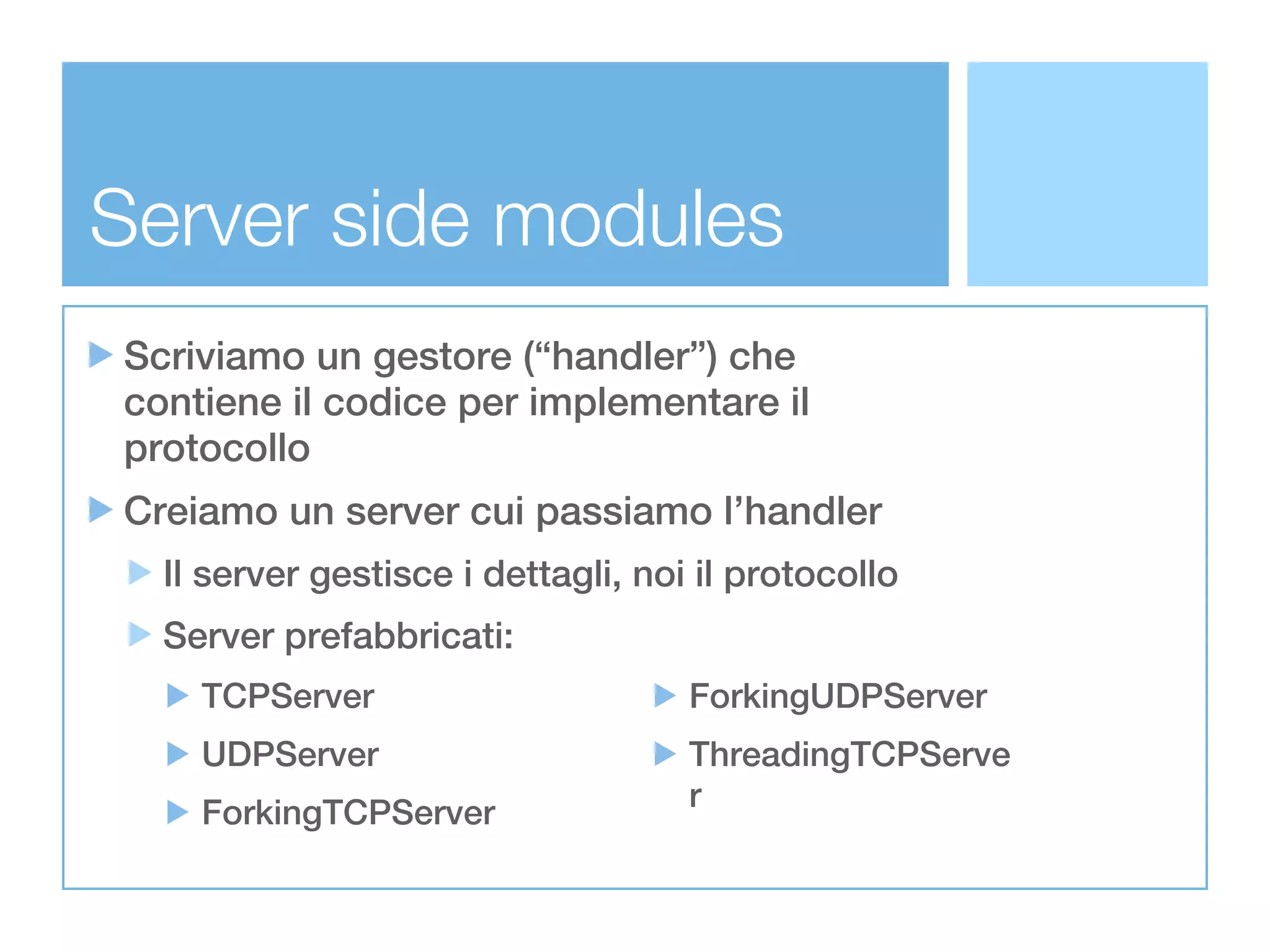
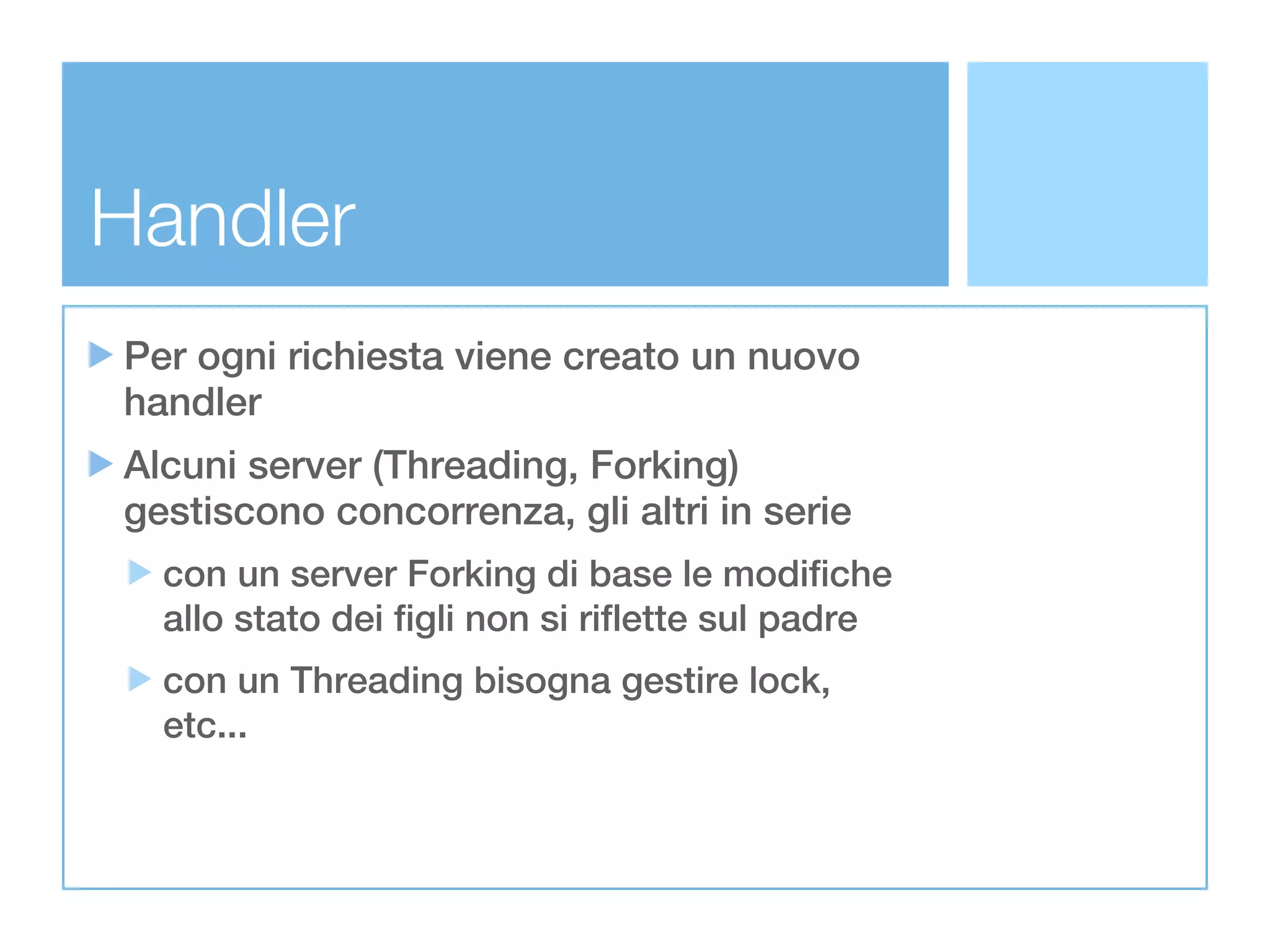
![Handler (2)
Si sottoclassa un handler
(SocketServer.BaseRequestHandler)
Si “overridda” handle(self) [e altro se
opport.]
Si hanno come variabili d’istanza
self.request: la richiesta (socket)
self.client_address: guess...
self.server: un’istanza del server
Entro certi limiti, si è indipendenti dal](https://image.slidesharecdn.com/pyimprovedagain-111019032257-phpapp01/75/Pyimproved-again-20-2048.jpg)
![Handler (2)
Si sottoclassa un handler
(SocketServer.BaseRequestHandler)
Si “overridda” handle(self) [e altro se
opport.]
Chi scrive trova
Si hanno come variabili d’istanza particolarmente
self.request: la richiesta (socket) orrendo
self.client_address: guess... il termine
self.server: un’istanza del server
Entro certi limiti, si è indipendenti dal](https://image.slidesharecdn.com/pyimprovedagain-111019032257-phpapp01/75/Pyimproved-again-21-2048.jpg)
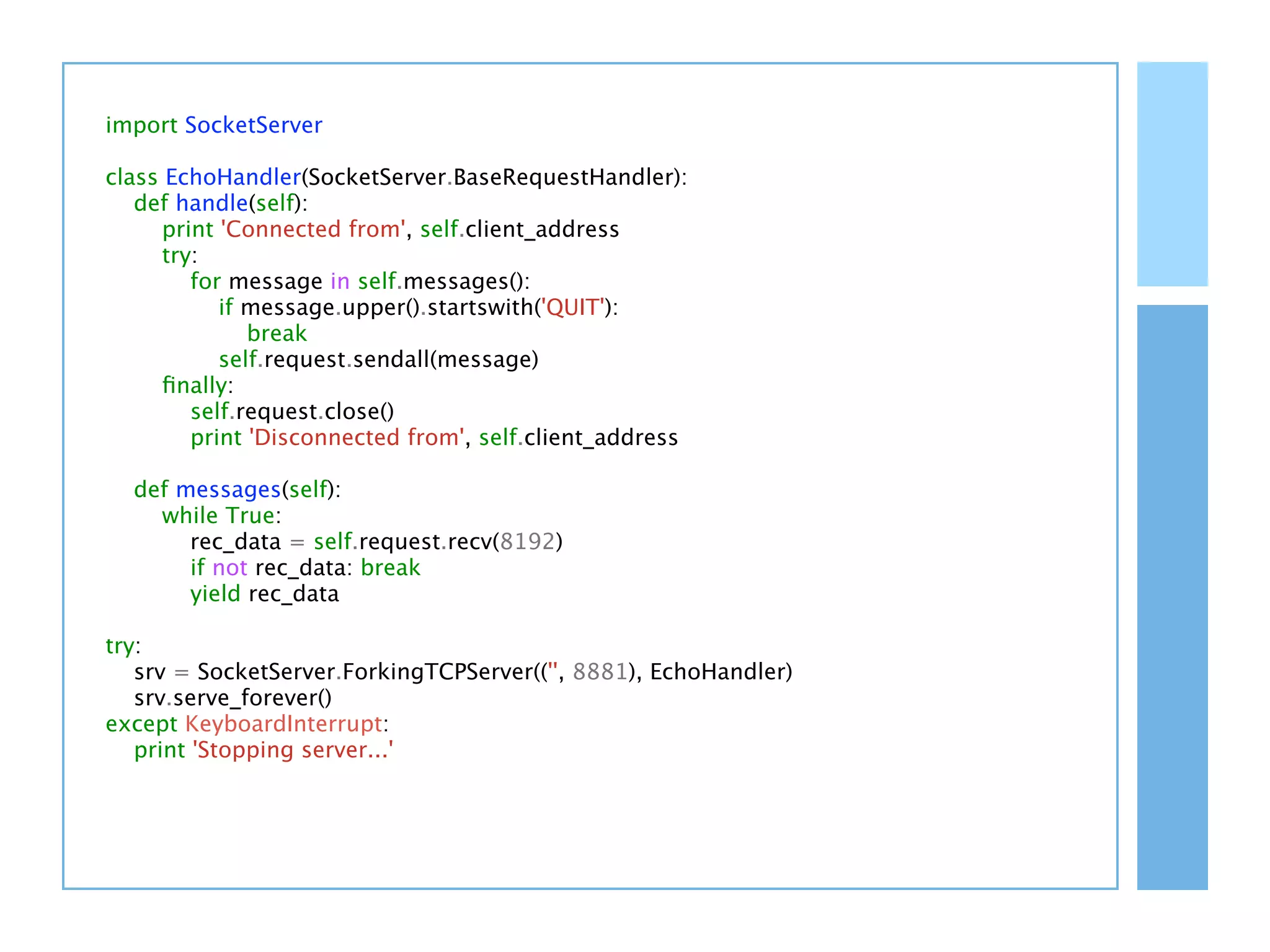
![Scriviamo Gumball!
Scriviamo un simulatore di macchine che
distribuiscono palline di gomma
Inserisci un quarto di dollaro
Gira la manovella
Fatti restituire il quarto di dollaro
[consegna la pallina]
L’esempio viene da Head First Design
Patterns, Freeman&Freeman, O’Reilly](https://image.slidesharecdn.com/pyimprovedagain-111019032257-phpapp01/75/Pyimproved-again-23-2048.jpg)


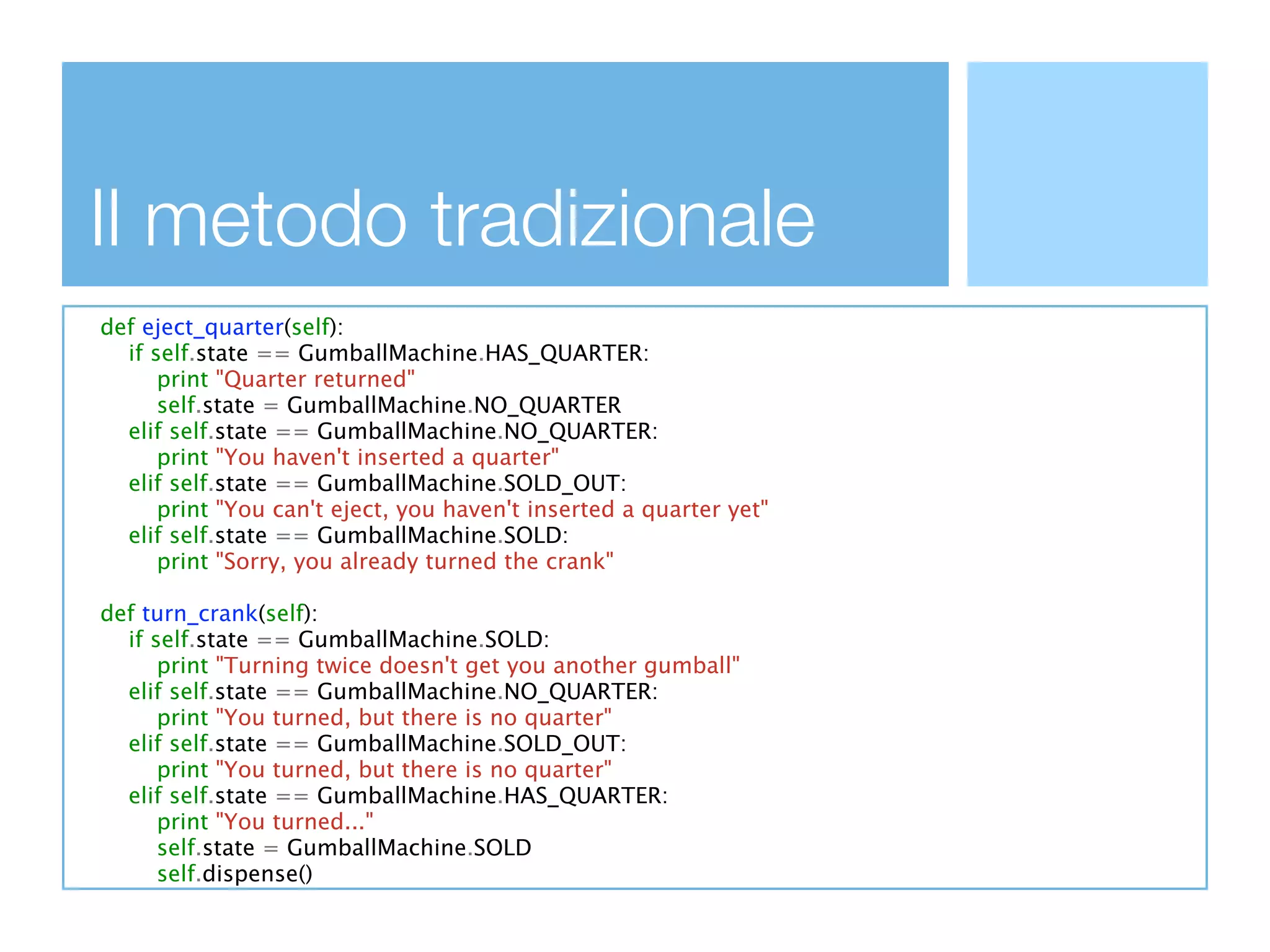
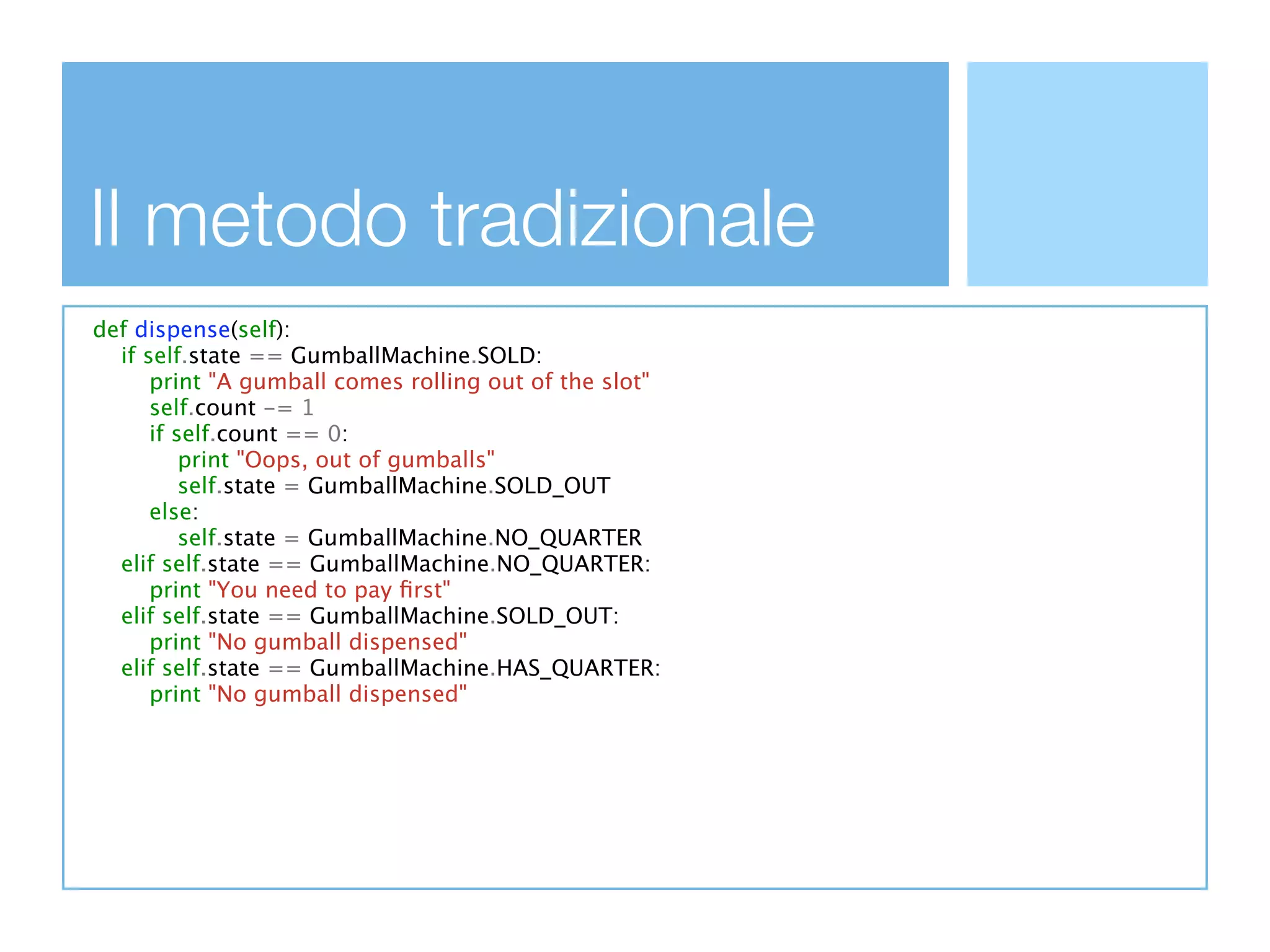
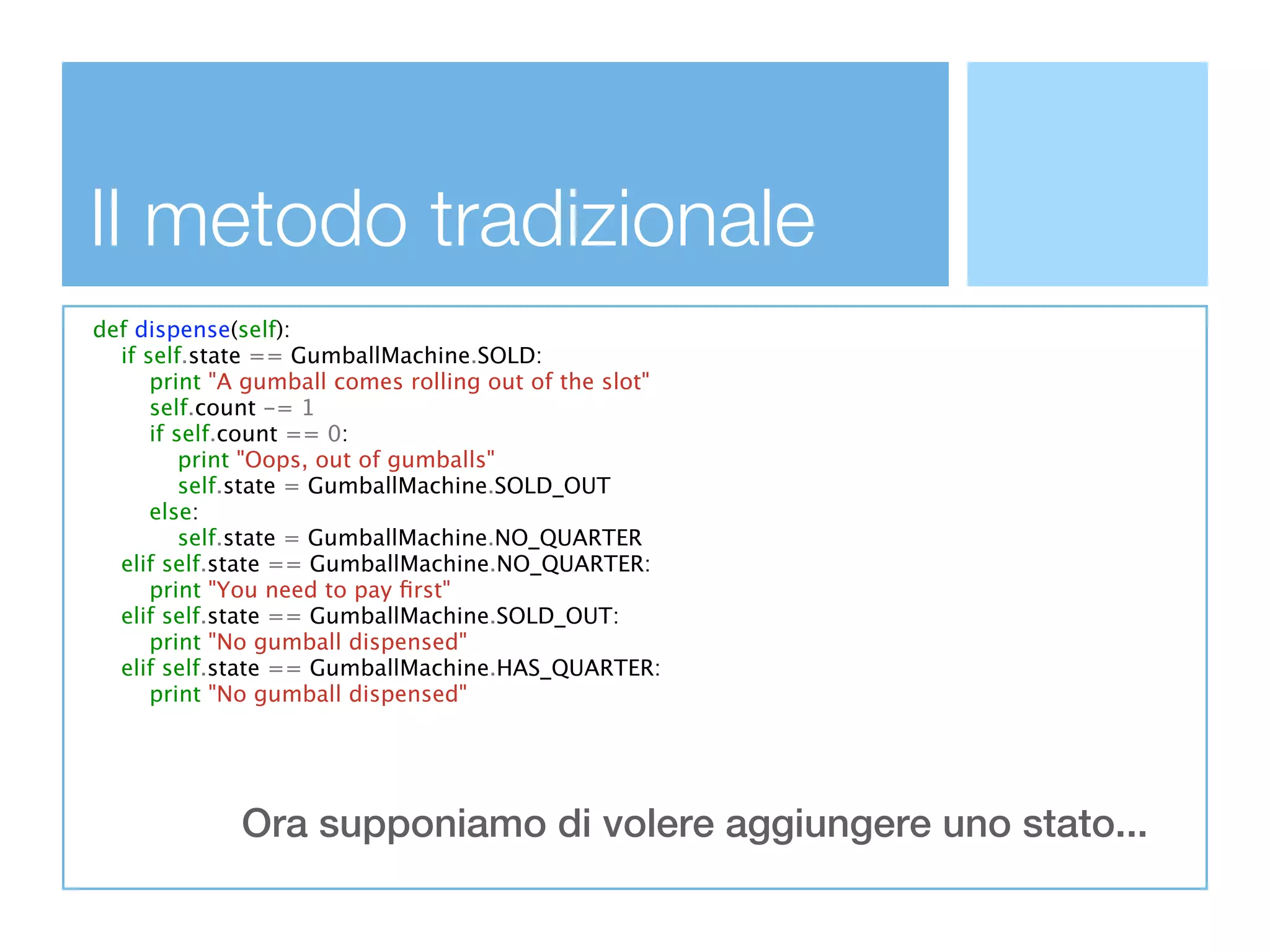


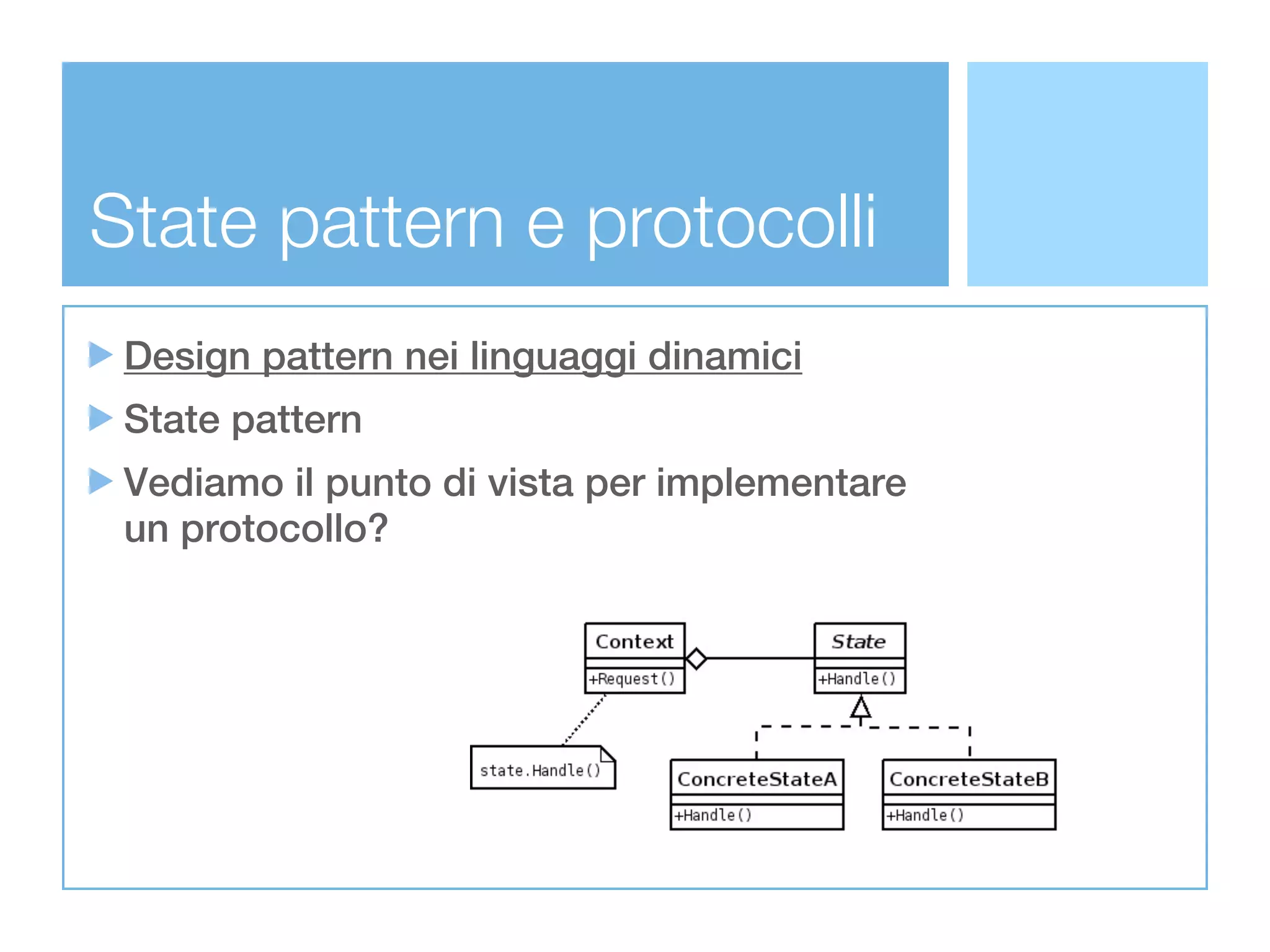
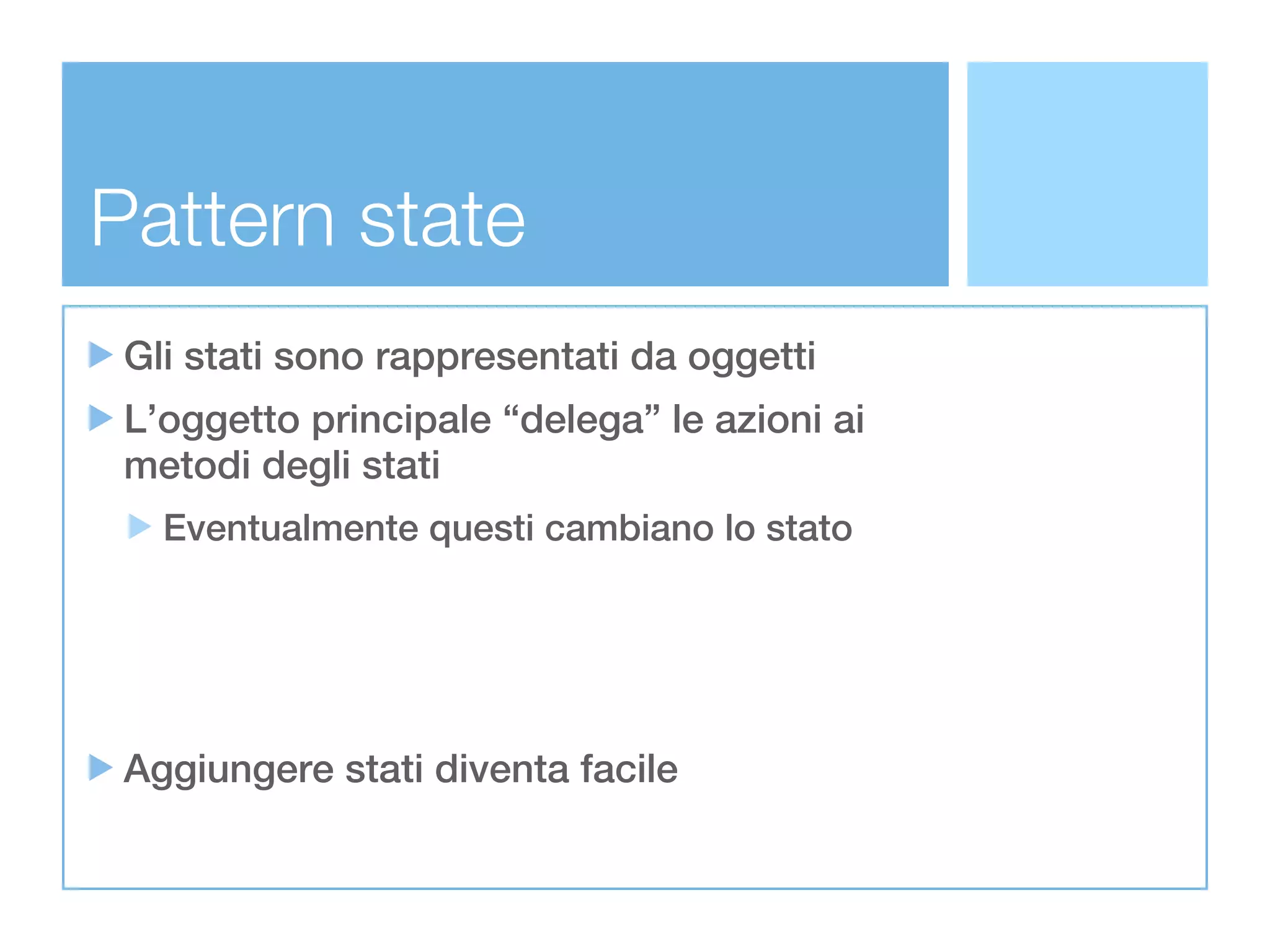
![class GumballMachine(object):
'The true and only gumball machine'
actions = set(['insert_quarter', 'eject_quarter',
'turn_crank', 'dispense'])
def __init__(self, count):
self.no_quarter = NoQuarterState(self)
self.has_quarter = HasQuarterState(self)
self.sold = SoldState(self)
self.sold_out = SoldOutState(self)
self.count = count
self.state = self.sold_out
if self.count > 0:
self.state = self.no_quarter
def __getattr__(self, action):
if action in GumballMachine.actions:
return getattr(self.state, action)
def __str__(self):
return ("nMighty Gumball, Incn"
"Python-enabled Standing Gumball Model #2009n"
"Built from orginal specifications by Freeman&Freeman,"
" Head First Design Patternsn"
"Inventory: %d gumballsn") % (self.count)](https://image.slidesharecdn.com/pyimprovedagain-111019032257-phpapp01/75/Pyimproved-again-33-2048.jpg)

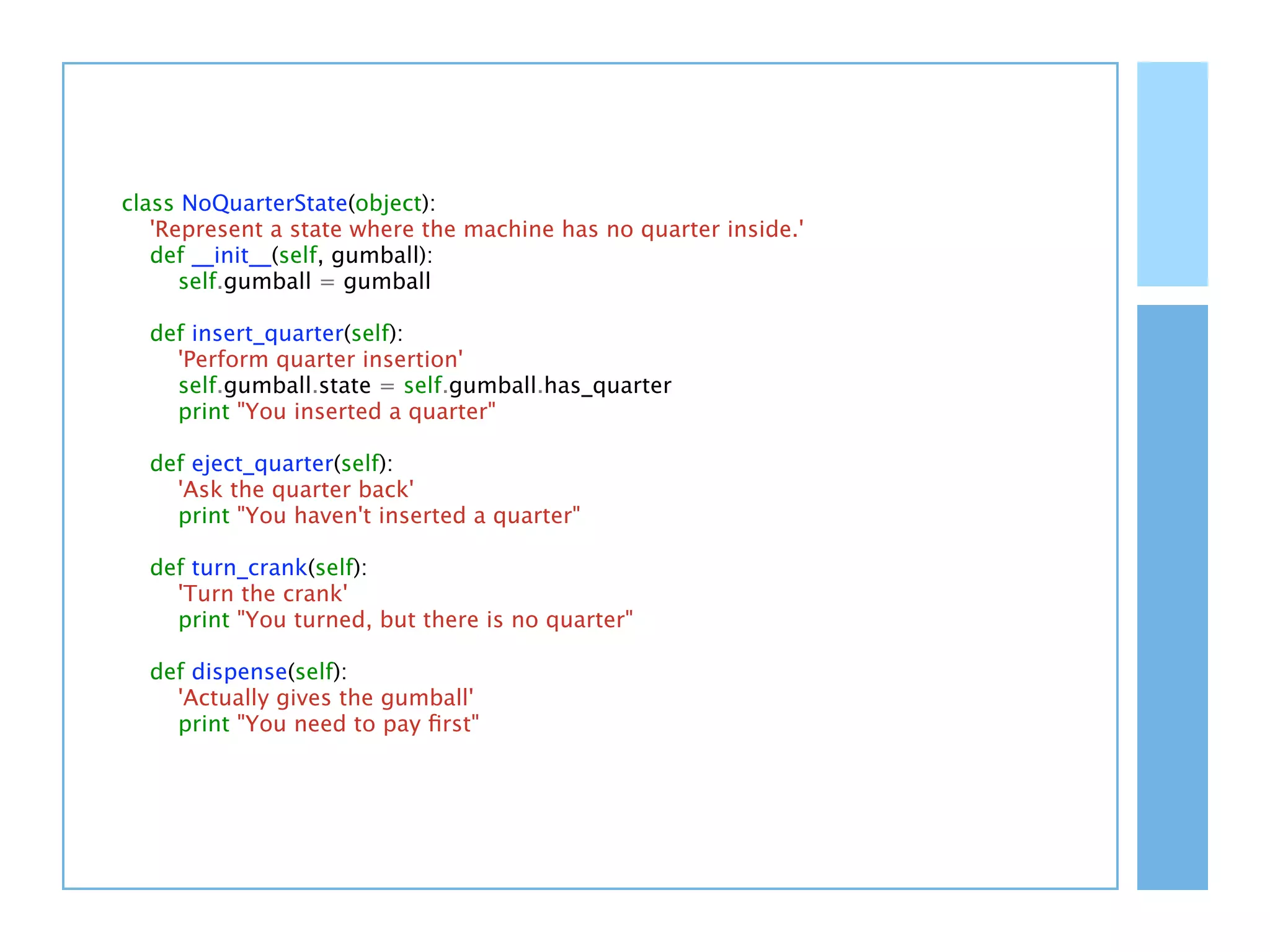
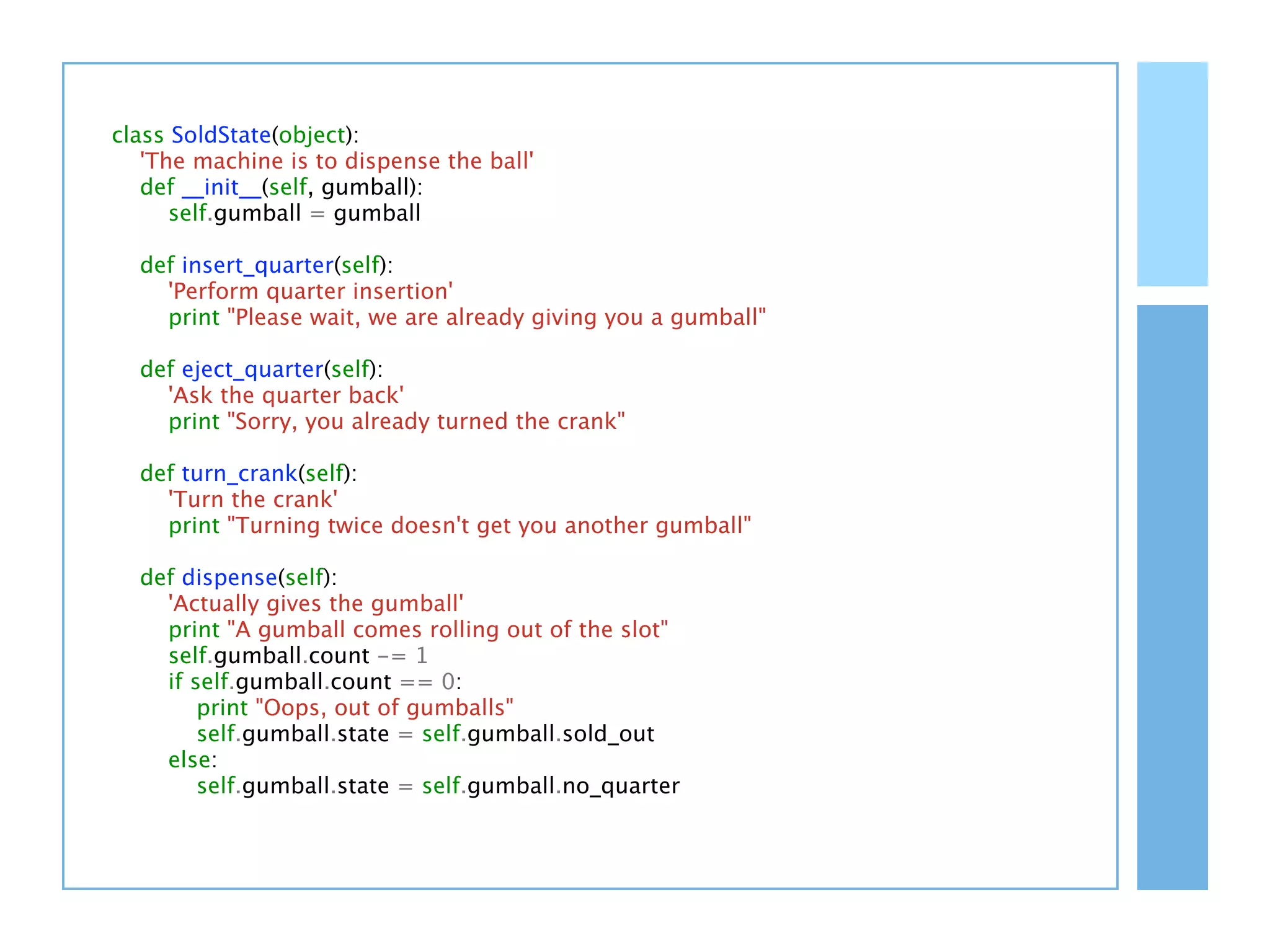
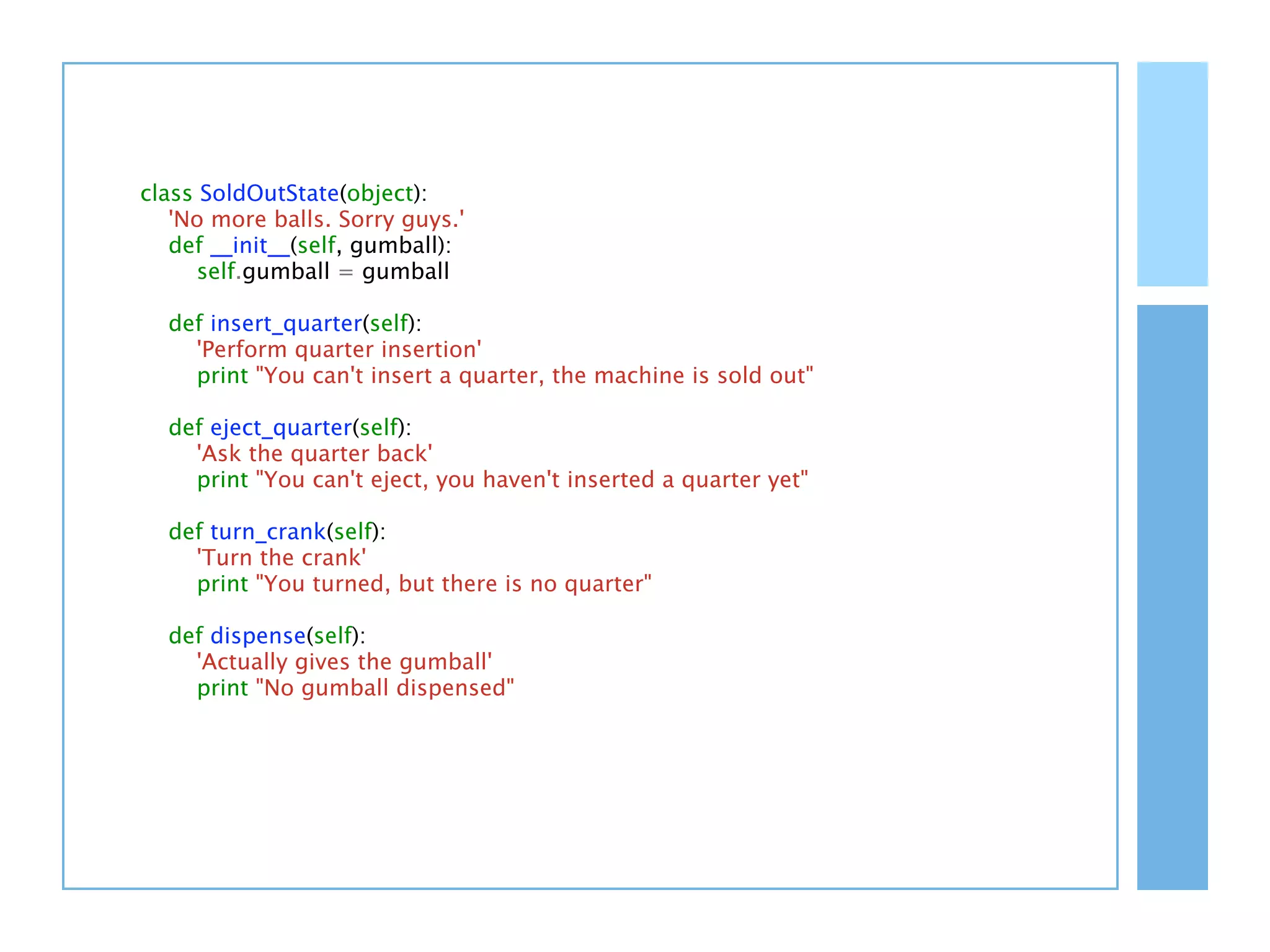
![Setattr
def __setattr__(self, name, value): ...
__getattr__viene chiamato solo quando non
si trova l’attributo, __setattr__ è chiamato
sempre
Attenzione ai loop se lo ridefinite!
def __setattr__(self, name, value):
if name in self.names:
self.k = value * self.conversion[name]
elif name == ‘k’:
object.__setattr__(self, name, value)
else:
raise AttributeError, name](https://image.slidesharecdn.com/pyimprovedagain-111019032257-phpapp01/75/Pyimproved-again-38-2048.jpg)


